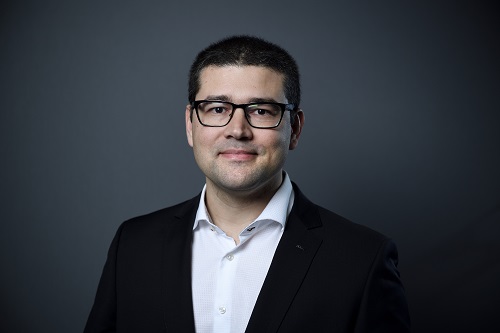Daniel Enrique Lucani Rötter
Forskningsleder

Projekttitel
Igniting a revolution in networks and storage to cope with the Internet of Things: A theory for Cloud-scale compression
Hvad handler dit projekt om?
This project aims at solving challenges for the Internet of Things (IoT). The IoT will grow the number of devices connected to our networks from 12 billion nowadays to 500 billion in the next decade. Our main problem is how to provide the mechanisms for the network and (Cloud) storage infrastructure to handle the massive amount of data that will be generated by these devices. The IoT data also has new characteristics, for example, it generates what is called ‘dynamic data,’ which means that our systems need to update very frequently the stored data because sensors can respond 1 hour or 1 day later than expected. In order to address these challenges, we will develop a novel theory for massive-scale compression of the IoT data and that allows for fast updates by matching similar fragments of data.
Hvordan opstod din interesse for dit forskningsfelt?
Although I was already very interested in becoming an engineer, it was during my bachelor and through the interaction with great professors that I realized that I wanted to contribute to communication networks and efficient ways to process and store data. Of course, it was during my PhD work in MIT that I found my calling in my particular research field and I have had the opportunity to explore and envision new communication solutions and Cloud systems as an Associate Professor in Aalborg University and, recently, as an Associate Professor at Aarhus University, where I am starting my own independent team.
Hvad er de forskningsmæssige udfordringer og perspektiver ved dit projekt?
A key challenge of the project is to re-envision the use of concepts from coding theory, typically used for standard compression of files or protection against errors in wireless communications, to provide a new way to index data by identifying similarities. This matching of similar data is our key to radically compress data. This means that our compression does not happen on individual files from different users or devices. Standard compression across multiple files is not typically used as it creates dependencies across files, meaning that changing one file would affect multiple. Our approach will give full flexibility to modifying individual files that are ‘matched’ without affecting the others. This is a break-through that allows us to compress more effectively and manage ‘dynamic data’ of the IoT.
Hvilke perspektiver vurderer du selv, at din forskning på sigt kan have for det omgivende samfund?
This Sapere Aude project has a number of key impacts to society. First, a dramatic reduction in the carbon footprint of networking and Cloud systems because we will require ten times less infrastructure to store data due to the results of the project. Second, the research training of new talents at Aarhus University with exchanges with top institutions in the world, such as MIT, U. Neuchatel, 5G Lab Germany, to help these new talents develop their research networks, bring back new knowledge to Denmark and disseminate our ideas worldwide. Third, practical experiments and interactions with Danish companies to develop a theory that will matter in practice and ultimately transfer this knowledge to Danish industry.
Hvad vil det betyde for din forskerkarriere, at du indgår i Sapere Aude-programmet?
The Sapere Aude grant opens a number of exciting opportunities in the future. First, it will allow my team and I to develop new knowledge and theories that can have a deep impact in how data is communicated and stored. This will kick-start a new revolution in networks and Cloud systems. Second, it provides me with a unique opportunity to train new talents. Thus, this grant will be crucial to fully unfold my potential as an independent researcher internationally as well as to help me establish and consolidate my independent research team in the Department of Engineering at Aarhus University.
Lidt om mennesket bag forskeren
After four years in MIT (US) and two and a half years in Portugal, I had the opportunity to come to Denmark in 2012. This was a challenging, but great decision in hindsight as Denmark has offered many opportunities to my wife and I over the years. I helped co-found a start-up company in Aalborg, which takes part of my spare time. I also love reading novels and traveling with my family.
Se alle forskningsledere her
- DFF-Forskningsledere 2024
- DFF-Forskningsledere 2023
- DFF-Forskningsledere 2022
- DFF-Forskningsledere 2021
- DFF-Forskningsledere 2020
- DFF-Forskningsledere 2019
- DFF-Forskningsledere 2018
- DFF-Forskningsledere 2017
- DFF-Forskningsledere 2016
- DFF-Forskningsledere 2015
- DFF-Forskningsledere 2014
- DFF-Forskningsledere 2013
- DFF-Forskningsledere 2012
- DFF-Forskningsledere 2011
Forskningsinstitution
Aarhus Universitet
Fagområde
Electrical and Computer Engineering, Network and Coding Theory, Data Storage
Bopælskommune
Hobro
Gymnasium
Colegio Champagnat (Caracas, Venezuela)
